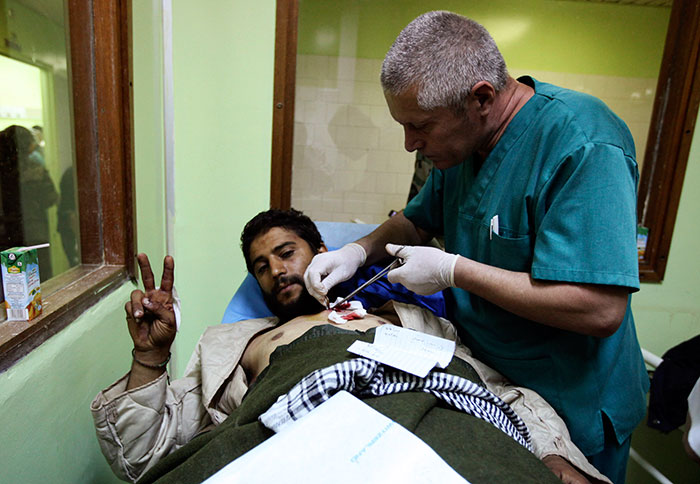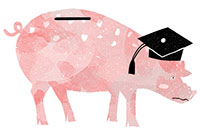
Tarek eats a croissant with a sweet, nutty filling. He is lying almost flat in a bed at Polyclinique Errachid in Sfax, Tunisia, some 500 kilometres northwest of Tripoli, where he and other young fighters (known as the shabab ) are resting and healing, and pre-Gadhafi flags hang over each bed. Flakes of pastry fall into Tarek’s chest hair. One of his guests, a fellow former rebel fighter, leans over and picks them out. With a smile, he says, “Grads,” referring to the rockets that used to drop on them in Dafniya, the western front in Misrata, Libya, and mimicking the movement with his hands. There, shrapnel took chunks out of young bodies. The soldiers who flooded into the regional field hospital looked less frightened than surprised by the possibility of death.
Tarek is a twenty-two-year-old Libyan Canadian. Born in Quebec, he grew up in Libya with dreams of returning, which he did after high school. Last February, when Libyans rose up to fight Moammar Gadhafi, he was a second-year business student at Bishop’s University in Sherbrooke, having previously worked part time at a Montreal Quiznos. He watched, alone in his apartment, as the revolution unfolded on television: “It seemed like a dream.” Soon afterward, he started attending protests in Montreal, where he found camaraderie and solace. A photo on Facebook shows him standing with other young Libyans, holding a white placard, bubble letters spelling out MR. HARPER PLEASE RECOGNIZE TRUE LIBYA. Despite the misgivings of his forty-year-old brother, Hatem, he decided to drop out of school and join the fight.
Missed Opportunities
Harvard Business School graduates spend money to make it
Sandi Falconer
FOMO, or fear of missing out, is a Millennial abbreviation (OMG,
WTF) that usually refers to our anxiety—induced by smart phones and social media—that something more important is always happening. At Harvard Business School, the acronym refers to the myriad extracurricular opportunities (conferences, seminars, clubs) designed to give graduates a jump on the competition. “FOMO [is] a persistent stalker on campus, sowing poison in every mind,” writes HBS graduate Philip Delves Broughton in his 2008 memoir Ahead of the Curve. These extracurricular (and extra-extracurricular) activities can come at a real price. A 2007 Bloomberg Businessweek MBA survey found that students spent as much as $80,000 a year on field trips to BRIC countries, weekend getaways to Vegas or Vail, and dinners with magnates halfway across the country—and for what? The year after the survey was taken, the Bear Stearns Companies collapsed, and Lehman Brothers Inc., a top ten employer of HBS alumni, soon followed. A combined 40,000 jobs in investment banking disappeared. The ensuing recession lowered starting salaries by 9 percent: in 2010, hard-working HBS grads could expect to make a measly $110,000 a year, down from $120,000 two years earlier.
—Bronwen Jervis
“I didn’t want to be the one who comes later,” he told me last April, when I met him for the first time at a mutual acquaintance’s home in Benghazi, Libya. He had just arrived, willing to die for his country, and was frustrated to find that engagement wasn’t as easy as showing up. Lounging on the cushions lining the guest room floor, he didn’t appear built for war. His two friends, fellow Libyan Canadians Adem and Qays, were lean and animated, but Tarek’s rotund frame, easy smile, and quiet, self-deprecating manner gave him a Winnie-the-Pooh-like presence. Adem and Qays talked about girls they would miss, girls who would miss them; Tarek talked about Montreal, and how much he missed his favourite spots. Between prayer breaks, they ate pizza and admired a friend’s AK-47 and FM light machine gun. “I want to get my share,” Tarek said.
Four and a half months later, a loyalist’s bullet pierced his spine. A second one caught his right thigh. For fifteen days, he languished near death, and when his wounds finally healed he couldn’t feel anything below his navel. Today he has regained feeling down to his upper thighs. “The doctors, they say it’s a good sign,” he says, as he brushes his hands over a baseball-sized rock, a stand-in for water in cleansing before prayers. His catheter hasn’t been working properly, so he buzzes for a nurse. A pretty Tunisian enters and rubs his lower stomach to encourage the flow.
The room is quiet but for the movie Step Brothers, which is playing on Middle East Broadcasting Centre 2. Onscreen, some kids have bullied Will Ferrell into licking dog feces. Tarek laughs, then moans. He winces periodically. “My brain keeps giving orders, and where the order goes the nerves are cut,” he says.
There’s the sound of footsteps and voices. A group of nine or ten men enters, and they smile solemnly as they cross their hands in front of themselves and behind their backs. At the head of the formation stands Dr. Nagi Barakat, the health minister of the National Transitional Council, which is paying for Tarek’s treatment. He pats the patient’s upper thigh, and tells him it’s only a matter of time before his care continues elsewhere, in Europe or Jordan.
The NTC has reported expenditures of $3.5 million (US) for treatment of the shabab since the war began. Some 50,000 Libyans were wounded and another 30,000 killed in the fight to free Libya, and Tarek’s generation carried much of the weight. The youths fought on the front lines, often without weapons.
Hatem looks on quietly. There are dark circles under his eyes; he has relocated to Sfax from Morocco, and his life is on hold while he takes care of Tarek. Later, in the privacy of the hallway, he tells me he wants to encourage his brother without creating false optimism. The doctors haven’t given him much reason to hope, he says.
“All that’s left is the rehab,” Tarek says confidently. “It’s the last step, and it’s the longest, six months to a year. I’ll go [back to Sherbrooke] even if I only make half recovery. As soon as I can look after myself. Back to same environment, same friends and professors, same roommate—it’s normal,” he says. I ask him if he thinks home can feel normal again. “What’s wrong with it? ” he replies. “I haven’t changed. I’ve seen a lot of stuff, people dying, losing parts of their bodies.” He blinks. “But I haven’t changed.”
This appeared in the January/February 2012 issue.



